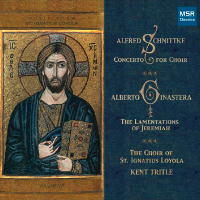
A Striking Urgency
Schnittke and Ginastera
from the Choir of
St Ignatius Loyola -
reviewed by
HOWARD SMITH'Not quite what one might expect.'
|

|
Whatever its merits a 21st century CD recording with less than fifty minutes playing time is, in my book, impossible to wholeheartedly recommend. This is such a release.
Its content (all 48'16"), recorded live, derives from the Biblical song bewailing the destruction of Jerusalem by Babylonians in 587 BC; first, Ginastera's Lamentations of Jeremiah (1946) followed by Schnittke's Concerto for Choir (1984/5) based on a mystical poetic setting of 'Lamentations; Chapter 3' by Armenian theologian / monk, Grigor Narekatsi (951-1003); a choral masterpiece for very large choir.
Ginastera wrote the Lamentations while he was in the USA in 1946. Its expressive character has similarities with Aaron Copland's a cappella In the beginning though Copland's dissimilar text is from Genesis (King James Bible). In the Beginning is a single-movement motet for mezzo-soprano 'story-teller' and unaccompanied chorus.
Copland's first performance was given with the Collegiate Chorale, conducted by Robert Shaw (1947). The work is available on Twentieth-century Masters ; Volume 3; Copland and his American Contemporaries -- The Choir of New College Oxford directed by Edward Higginbottom (Avie AV 2086).
Ginastera (1916-1983) had early appeal on both sides of the Atlantic at a time when Argentina was rich in masterly composers -- his contemporaries included such notable voices as Luis Gianneo (1897-1968), Juan José Castro (1895-1968) and Carlos Guastavino (1912-2000).
Moreover, Jeremiah's texts had inspired composers as long before as Palestrina (1525-1594) with his a cappella Lamentationes Ieremiae Prophetae (1555-1561), as well as Tallis (1505-1585) and Handel (1685-1759).
The theme is indeed universal and expressed by writers down the ages -- viz: 'Once to die is better than length of days in sorrow without end' (Aeschylus, c525-456 BC), 'Sorrow was all my soul; I scarce believed, Till grief did tell me roundly, that I lived' (George Herbert, 1593-1633), 'There is no such thing as old age, there is only sorrow' (Edith Wharton, 1862-1937), 'Even in laughter the heart is sorrowful; and the end of that mirth is heaviness' (anon modern).
Ginastera's 11'16" work is divided into three parts: O vos omnes, Ego vir videns and Recordare, Domine.
The 1'50" opening O vox omnes has a challenging, unexpected spin. Far from an expression of penitence, it is on fire with vexation even as the prophet declares 'all of you who pass through life behold and see if there be any sorrow like unto my sorrow'. Not quite what one might expect.
Movement 2, Ego vir videns paupertatem meam (Lamentation Book 3) is as sombre and abject as the bleak text; yet Ginastera magically captures the faith of the prophet from within the gloom.
Finally Recordare, Domine, quid accederit nobis, as the prophet implores The Lord to 'consider and behold our humiliation'; Ginastera brings the women's voices into greater prominence than hitherto.
Listen -- Ginastera: Recordare (Op 14)
(track 3, 2:55-4:03) © 2008 St Ignatius Loyola
A work of such heartfelt, devotional power deserves to be performed far more frequently. Here with the New York (Park Avenue) Choir, an ensemble that expands as required, we have a splendid performance -- one that should have been accompanied by more than a meager extra thirty seven minutes.
Concertos for choir are hard to come by, though Ukrainian composers Artemy Vedel (1767-1808) and Dmitrij Stepanovic Bortnjanskij (1751-1825) wrote quite a number between them. At least five volumes of Bortnjanskij's 'Sacred Concertos' are available with Valery Polyansky and the Russian State Symphonic Choir (RSSC) on Chandos.
Unquestionably one of the choral masterpieces of the 20th century, Alfred Schnittke's Concerto for Mixed Chorus is an extended setting (about forty minutes' duration) for SATB choir. The 'Choral Concerto' is in four sections conforming with Narekatsi's text. It's a movingly expressive and complex work, combining the Russian / Soviet's compositional 'thumbprints' with a passionate, uniquely Slavic depth of feeling.
Schnittke's four texts are (1) O Pavelitel' sushchevo fsevo ('O Master of all living'), (2) Sabran'je pesen sikh, gde kazhdy stikh ('I, an expert in human passions'), (3) Fsem tem, kto vniknet fsushchnast ('God grant deliverance from sin') and (4) Sej trud, shto natchinal ja supavan'jem ('Complete this work').
Along the way this religious paean has ravishing harmonies; notably at variance with Schnittke's serial work of the 1960s.
Listen -- Schnittke: God, grant deliverance ...
(track 6, 10:40-11:44) © 2008 St Ignatius Loyola
The Choir of St Ignatius Loyola sings Schnittke with a striking urgency during which Kent Tritle clips approximately six minutes off the same work with Polyansky and the RSSC on Chandos, unmistakably in winning form.
Regrettably, with this one work, Chandos shortchanges us just as MSR Classics has. Far better turn to Hyperion where the 'concerto' is coupled with Schnittke's Voices of Nature and Minnesang. (Minnesang was the tradition of lyric and song writing in Germany which flourished in the 12th century and continued into the 14th century.)
For this recording, the Holst Singers (director Stephen Layton) were augmented by large contingents of London's finest singers. The haunting and evocative Voices of Nature is a vocalese -- without words -- for female voices and vibraphone. (Hyperion CDA67297, 2002 -- 64'33")
Ginastera's Lamentations may also be found along with a fascinating assortment of separate items on the 75 minute-long Oratio : 20th Century Sacred Music from Spain and Latin America. (Coro Cervantes, conducted by Carlos Fernández Aransay on Guild Records GMCD 7266, 2003, recorded in Hampstead, London)
The Guild composers beside Ginastera are Nemesio Otaño Eguino, Ernesto Halffter, Jesús Guridi, Javier Busto, Frederic Mompou, Fernando Remacha, Pau Casals, Cristóbal Halffter, Joaquín Rodrigo, Joaquim Homs, Padre José Antonio Donostia, Xavier Montsalvatge, Anton García Abril and César Cano.
Copyright © 9 June 2009
Howard Smith,
Masterton, New Zealand
 CD INFORMATION: SCHNITTKE AND GINASTERA
CD INFORMATION: SCHNITTKE AND GINASTERA
BIBLE JERUSALEM ALBERTO GINASTERA ALFRED SCHNITTKE ARMENIA UNITED STATES OF AMERICA RUSSIA ARGENTINA
| 
